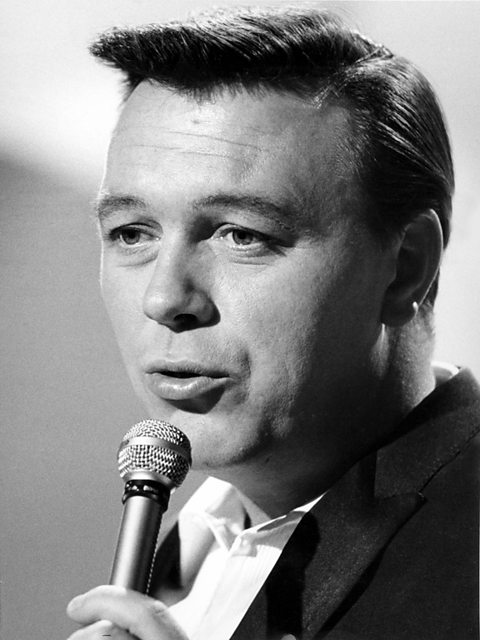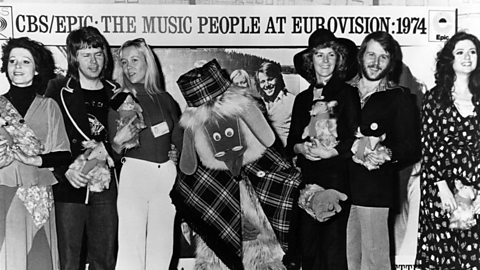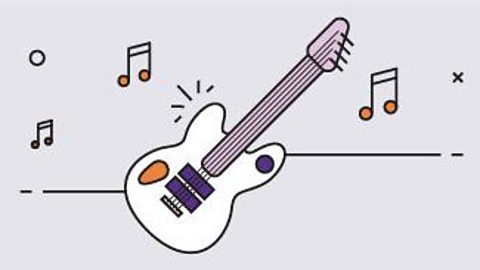The most famous song competition in the world often goes toe-to-toe with current affairs.
This year's Eurovision Song Contest takes place in Rotterdam, the city due to host in 2020 before the Covid-19 pandemic led to the event's cancellation. It was the first year since the competition began in 1956 that no Eurovision took place.
It isn't Eurovision's first brush with international news. An event more usually associated with perfect pop and family entertainment, the 65-year-old show has often mirrored the headlines in ways few people - especially the organisers - could ever have expected. Here are a few examples.
1977: Strike, camera, inaction
Before 2020, the closest Eurovision ever came to being cancelled happened right here in the UK in 1977.
Although we have a run of Contest results few nations wish to emulate these days, it used to be a very different story. In 1976, Brotherhood of ManÔÇÖs Save Your Kisses for Me not only won for the UK at The Hague in The Netherlands, but the song became the biggest selling single of the year at home and topped the charts in many other countries.

Winners (usually) host the next show - itÔÇÖs a Song Contest tradition - and the 1977 edition, comp├¿red by ┤¾¤¾┤½├¢ newsreader Angela Rippon, was all set to go ahead at the newly built Wembley Conference Centre on April 2. But in an era when industrial action was not uncommon in Britain, all singing was silenced in epic fashion.
A strike by ┤¾¤¾┤½├¢ cameramen and technicians had already shifted the Song For Europe competition to decide the UK entry off TV and on to the radio. It looked like the Contest would suffer the same fate with no resolution between management and the unions apparent. Indeed, April 2 came and went with no Contest shown, but ultimately the strike was resolved and the competition went ahead five weeks late on May 7. There were calls for the Netherlands to step in and host a last-minute version of the Contest, but their camera crews refused, in solidarity with their British counterparts.

1964: The first onstage protester
SuRie was unfortunate enough to have her performance of the UK entry Storm interrupted by a stage invader in Lisbon in 2018. But surprisingly, the first example of someone hoping to further their cause by disrupting the live broadcast happened more than 50 years earlier.
In 1964, Tivoli Gardens amusement park in Copenhagen, Denmark, welcomed 16 nations (including crooner Matt Monro as the UK entry) to its concert hall for the ninth edition of the competition. All was going well until Switzerland, the 14th nation in the running order that evening, had finished its song. The stage was then invaded by a protester with a banner urging the continent to "Boycott Franco and Salazar" - the dictators then in power in Spain and Portugal respectively.
The director acted swiftly and cut to a shot of the scoreboard while the protester was removed.

1974: To Sì or not to Sì
The big story of the 1974 Contest held in Brighton will forever be the international breakthrough of ABBA. But six points behind them in second place, an equally remarkable tale was being written.

Gigliola Cinquetti won ItalyÔÇÖs first Eurovision title in commanding style at the aforementioned Copenhagen contest. A decade later she returned with the ethereal ballad S├¼, the title of which (meaning ÔÇÿYesÔÇÖ) caused big problems back home.
Six weeks after the Brighton Contest, Italy was to hold a referendum over whether to repeal a three-year-old law which made divorce legal. Even with the vote more than a month away, the Italian broadcaster decided a song called ÔÇÿS├¼ÔÇÖ could be seen as a subliminal message to the public, aligning them with those wishing to see divorce abolished.
The only thing to do was to delay the broadcast in Italy until after the referendum - where the ÔÇÿnoÔÇÖ campaign won with almost 60% of the vote.
1993: Competing against the odds
You have to wonder why the story behind Bosnia & HerzegovinaÔÇÖs debut Eurovision entry hasnÔÇÖt been made into a film, as it was sheer determination which brought it all the way to the final in Millstreet, Ireland.
Performed by the group Fazla, the song Sva Bol Svijeta (The Whole WorldÔÇÖs Pain) was written about - and during - the Bosnian war which gripped the nation between 1992 and 1995.
With electricity cut off around the beseiged capital Sarajevo, even the recording of the song had to be done with a generator powered by black market fuel. Getting out of the country was also an ordeal, as the airport was heavily patrolled by Serbian forces. The band had to cross a mountain before heading to the Croatian capital Zagreb, often at risk of snipers.
Once in Ireland, they received warm applause from a sympathetic crowd before the song began. The fairytale ending wasnÔÇÖt to be: Fazla finished in 16th place with 27 points, 156 behind winners Ireland.
2019: Forty-two Becomes Forty-one
Last-minute withdrawals are not uncommon at Eurovision. In 2009, a Georgian entry deemed too thinly veiled a dig at Russian premier Vladimir Putin was banned by Contest chiefs before the draws for the semi-finals (to be held in Moscow) were made.

But the 2019 competition saw a country disqualify itself.
Maruv (better known as Anna Korsun) won the Ukraine national heats with Siren Song, a thumping dance track which leapt to the top of the online fan polls. Things couldnÔÇÖt have got off to a better start - until Maruv was asked to sign her Eurovision contract. It confirmed she would not do any gigs in neighbouring Russia until after the Contest, as well as other clauses linked to UkraineÔÇÖs hostile relationship with their neighbours.
Maruv felt the contract turned her into a political pawn and refused to sign. In solidarity, the second and third placed artists in the Ukrainian heat turned down the opportunity to replace her.
The broadcaster had no other option but to withdraw, bringing the number of participants to 41. Russia wound up finishing third.
This article was published in May 2019
A bitesize history of Christmas number ones
Come read all about the top of the pops to the top of the flops.

WhatÔÇÖs the story behind the iconic BAFTA mask?
Learn all about the history of one of the most recognisable trophies in the world.

Pop music. revision-guide
Want to write your own Christmas number one? Learn all about pop music here.
